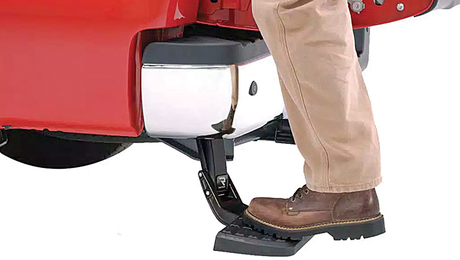I have two heating systems in my house. Forced hot air oil for the first floor and a heat pump for the second floor. I’m not a fan of heat pumps, but this combination is working well for me. I’m about to put a humidifier on the unit for the first floor. The steam humidifier I’m getting has enough capacity for the whole house. How much of that humidity will find its way to the second floor? I could also put a humidifier on the 2nd floor, but since the attic and is subject to freezing temperatures, that’s an extra element of pain I’d just as well avoid.
Discussion Forum
Discussion Forum
Up Next
Video Shorts
Featured Story

The RealTruck AMP Research Bedsteps give you easy access to your truck-bed storage.
Featured Video
How to Install Exterior Window TrimHighlights
"I have learned so much thanks to the searchable articles on the FHB website. I can confidently say that I expect to be a life-long subscriber." - M.K.














Replies
If you can arrange some sort of ductwork connection between the two systems then the humidity will equalize fairly well.
happy?
Humidifying the single unit that serves the first floor is all that is required. The vapor will fill the entire space, wether you want it to or not, in an attempt to reach equilibrium.
The new trend in thinking about humidification is that houses dry out because of too many air exchanges and you lose the moisture which naturally gets put into the air by household activities: washing, cooking, even breathing.
If yourt house is getting too dry, work first on improving weatherization and slowing down the air exchange rate, which keeps the moisture in and cuts down on your feul costs.
There's a limit to how much weatherization is practical. I'd guess we've cut infiltration in our house by a factor of 4 or more since it was built, but we still need humidification. Of course this is partly because it's just the two of us and I shower at the gym most days and my wife takes tub baths.
If ignorance is bliss why aren't more people
happy?
"The new trend in thinking about humidification is that houses dry out because of too many air exchanges and you lose the moisture ...."
Bob, I didn't realize this was new thinking. It is the only way I undestand houses to dry in the winter.
What was the "old way" of thinking on this?
>>What was the "old way" of thinking on this?That the very fact of heating air made it dry, without regard for air changes....
View Image
Sojourners: Christians for Justice and Peace
But that was blatant nonsense. Anyone with even a primitive understanding of the physics of humidity knew it wasn't true.
If ignorance is bliss why aren't more people
happy?
And gas heat made the ceilings turn yellow, ignoring the 2 pack a day habit in the house.LOL
"Anyone with even a primitive understanding of the physics of humidity knew it wasn't true"
Tell that to the wetheads that believe heating air by passing it over a hot metal surface with hot water and/or steam inside has a magically different effect on the room air than if the hot metal surface has hot gases inside of it.
I can't recall how many plumber/heating guys use the term "scorched air". To me this is a big red flag that says, "I'm ignorant of psychrometrics".
Others refer to hyrdonics as "Healthy Heating", which is also BS. These people should know better and endeavor to promote their products based on the truth and real benefits, not by mud slinging.
Yeah. Certainly with the old "teapot" steam radiator systems there was some extra humidity added to the air, but a properly-functioning hot water or closed steam system adds none. Similarly, the only way that a forced-air system might affect humidity would be due to air leaks in ductwork outside the "envelope", and a slight increase in basic building air exchange rate due to the slight pressure gradients produced by the fan. In a properly constructed home neither of these factors would be significant.
If ignorance is bliss why aren't more people
happy?
Actually, the absolute humidity stays the same, the relative humidity changes with the air temp. Check this out.
http://www.heatinghelp.com/newsletter.cfm?Id=170